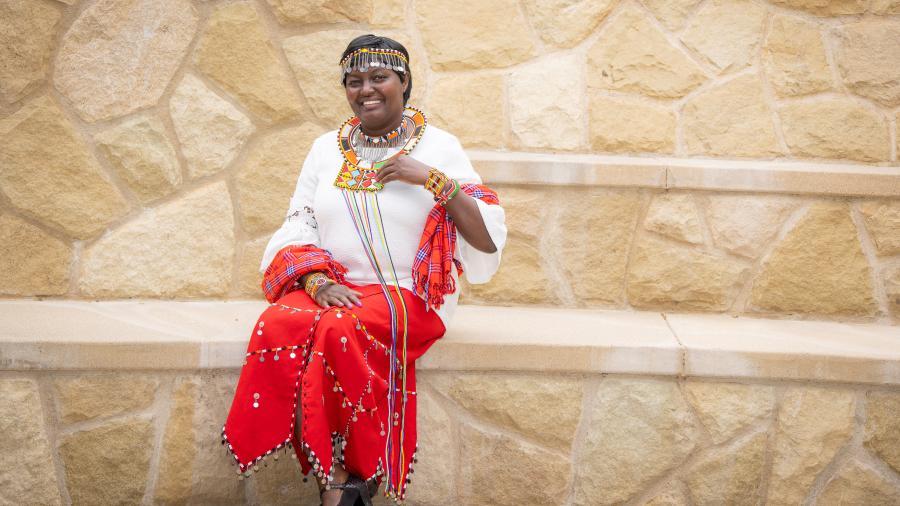Westmont Magazine A Cultural Perspective on Conscience and Character Development

Serah Shani has been teaching anthropology classes remotely throughout the year, but this summer she travels to Kenya—fully vaccinated—to continue her research among indigenous Maasai. The John Templeton Foundation has awarded her a $230,304, three-year grant to study “The Cultural Evolution of the Conscience, Virtues, Character Development, and Human Progress.” She’ll spend each summer and winter break in Kenya through 2024.
“Field work for this in-depth study needs to be hands-on,” she says. She’ll train a research assistant who will help her conduct interviews, write field notes and categorize and organize the information. “You have to make notes every day,” she says. “Otherwise, you lose what you’ve learned. I write, analyze and then categorize. I’ve always done this by myself, but the grant provides funds for an assistant.”
Shani’s research explores the moral values and virtues Maasai parents teach their children so they can succeed in a competitive market economy. She examines moral enculturation within different socioeconomic groups as well as the effect of religion, geography, markets and missionary work on moral development. What moral values do traditional Maasai hold in common, and what global influences shape them? Her pioneering work will be the first to research conscience among the Maasai using both qualitative and quantitative methods drawn from interdisciplinary perspectives.
Her research reflects her interest in children and how parents train them to fit into the modern economy, which emphasizes individualism and competition rather than the communalism of traditional Maasai culture. How do parents negotiate that difference?
What morals do they teach—and do their morals come from Christianity or traditional African religion? In what ways do religions influence the moral values of children? How do economic and geographic forces affect values?
“I’m interested in asking these questions in Kenya among different people to look at character development,” she says. “How does parenting shape character development and what moral frameworks guides parents? What is important and central for them, and what is negotiable? What parenting takes place in the formative years of youth?”
Shani’s research assistant will be Stephen Supeet Meriki, a Maasai anthropologist who speaks Swahili, English and Maasai. “He knows the terrain very well as he grew up there,” she says. Shani will also work with two consultants: Lee Cronk, an anthropology professor at Rutgers University who has studied the Maasai for many years; and Athena Aktipis, a psychology professor at the University of Arizona. Both codirect the Human Generosity Project.
The grant requires her to publish six articles and speak at six conferences to report on her research. Each summer, she’ll interview 75 people and complete two papers based on that work. She’ll focus on a different village each summer to reach a variety of people as the Maasai are not a homogeneous group. When the grant period ends, she expects to have enough material for a book or two. Previously, she published “African Immigrant Families in the United States: Transnational Lives and Schooling” in 2018 and has signed a contract with Routledge Publishing Press for a second book, “Indigenous Elites in Africa: The Case of Kenya’s Maasai.”
Anthropology students learn about Shani’s work in class, and two will help her analyze the data she collects
in Kenya. Students also assisted her with editing her book and writing an annotated bibliography. “They learn a
lot through this process and get exposed to research and interviews,” she says. “I enjoy working with them and sharing my examples and experiences in Kenya."
Shani, who speaks five languages (including Maasai), completed her doctorate in cultural anthropology at Columbia University. She has earned three master’s degrees: sociology of health and medicine at Indiana University of Pennsylvania; international and transcultural studies at Columbia; and anthropology and education at Columbia. A native of Kenya, she graduated from Daystar University in Nairobi, concentrating on community development and music. She joined the Westmont faculty in 2016.
The papers Shani publishes will increase understanding of the nature and evolution of conscience cross-culturally, a topic little studied. Her findings will begin documenting how human values evolve and are accepted, challenged, transformed or take new forms in the midst of cultural change. “As globalization increases, it becomes more and more important to develop such intercultural competence,” she says.
